Fleurs du Mal Magazine


Or see the index
.jpg)
John Keats
(1795-1821)
Fancy
Ever let the Fancy roam,
Pleasure never is at home:
At a touch sweet Pleasure melteth,
Like to bubbles when rain pelteth;
Then let winged Fancy wander
Through the thought still spread beyond her:
Open wide the mind’s cage-door,
She’ll dart forth, and cloudward soar.
O sweet Fancy! let her loose;
Summer’s joys are spoilt by use,
And the enjoying of the Spring
Fades as does its blossoming;
Autumn’s red-lipp’d fruitage too,
Blushing through the mist and dew,
Cloys with tasting: What do then?
Sit thee by the ingle, when
The sear faggot blazes bright,
Spirit of a winter’s night;
When the soundless earth is muffled,
And the caked snow is shuffled
From the ploughboy’s heavy shoon;
When the Night doth meet the Noon
In a dark conspiracy
To banish Even from her sky.
Sit thee there, and send abroad,
With a mind self-overaw’d,
Fancy, high-commission’d:–send her!
She has vassals to attend her:
She will bring, in spite of frost,
Beauties that the earth hath lost;
She will bring thee, all together,
All delights of summer weather;
All the buds and bells of May,
From dewy sward or thorny spray;
All the heaped Autumn’s wealth,
With a still, mysterious stealth:
She will mix these pleasures up
Like three fit wines in a cup,
And thou shalt quaff it:–thou shalt hear
Distant harvest-carols clear;
Rustle of the reaped corn;
Sweet birds antheming the morn:
And, in the same moment, hark!
‘Tis the early April lark,
Or the rooks, with busy caw,
Foraging for sticks and straw.
Thou shalt, at one glance, behold
The daisy and the marigold;
White-plum’d lillies, and the first
Hedge-grown primrose that hath burst;
Shaded hyacinth, alway
Sapphire queen of the mid-May;
And every leaf, and every flower
Pearled with the self-same shower.
Thou shalt see the field-mouse peep
Meagre from its celled sleep;
And the snake all winter-thin
Cast on sunny bank its skin;
Freckled nest-eggs thou shalt see
Hatching in the hawthorn-tree,
When the hen-bird’s wing doth rest
Quiet on her mossy nest;
Then the hurry and alarm
When the bee-hive casts its swarm;
Acorns ripe down-pattering,
While the autumn breezes sing.
Oh, sweet Fancy! let her loose;
Every thing is spoilt by use:
Where’s the cheek that doth not fade,
Too much gaz’d at? Where’s the maid
Whose lip mature is ever new?
Where’s the eye, however blue,
Doth not weary? Where’s the face
One would meet in every place?
Where’s the voice, however soft,
One would hear so very oft?
At a touch sweet Pleasure melteth
Like to bubbles when rain pelteth.
Let, then, winged Fancy find
Thee a mistress to thy mind:
Dulcet-ey’d as Ceres’ daughter,
Ere the God of Torment taught her
How to frown and how to chide;
With a waist and with a side
White as Hebe’s, when her zone
Slipt its golden clasp, and down
Fell her kirtle to her feet,
While she held the goblet sweet
And Jove grew languid.–Break the mesh
Of the Fancy’s silken leash;
Quickly break her prison-string
And such joys as these she’ll bring.–
Let the winged Fancy roam,
Pleasure never is at home.
John Keats poetry
fleursdumal.nl magazine
More in: Archive K-L, John Keats, Keats, John

John Keats
(1795 – 1821)
When I Have Fears
When I have fears that I may cease to be
Before my pen has gleaned my teeming brain,
Before high-piled books, in charactery,
Hold like rich garners the full ripened grain;
When I behold, upon the night’s starred face,
Huge cloudy symbols of a high romance,
And think that I may never live to trace
Their shadows, with the magic hand of chance;
And when I feel, fair creature of an hour,
That I shall never look upon thee more,
Never have relish in the fairy power
Of unreflecting love; – then on the shore
Of the wide world I stand alone, and think
Till love and fame to nothingness do sink.
John Keats poetry
fleursdumal.nl magazine
More in: Archive K-L, John Keats, Keats, John
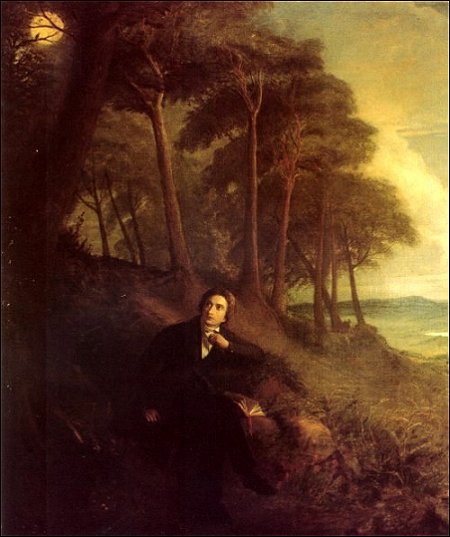
John Keats
(1795–1821)
Ode to a nightingale
My heart aches, and a drowsy numbness pains
My sense, as though of hemlock I had drunk,
Or emptied some dull opiate to the drains
One minute past, and Lethe-wards had sunk:
‘Tis not through envy of thy happy lot,
But being too happy in thine happiness,–
That thou, light-winged Dryad of the trees,
In some melodious plot
Of beechen green, and shadows numberless,
Singest of summer in full-throated ease.
O, for a draught of vintage! that hath been
Cool’d a long age in the deep-delved earth,
Tasting of Flora and the country green,
Dance, and Provençal song, and sunburnt mirth!
O for a beaker full of the warm South,
Full of the true, the blushful Hippocrene,
With beaded bubbles winking at the brim,
And purple-stained mouth;
That I might drink, and leave the world unseen,
And with thee fade away into the forest dim:
Fade far away, dissolve, and quite forget
What thou among the leaves hast never known,
The weariness, the fever, and the fret
Here, where men sit and hear each other groan;
Where palsy shakes a few, sad, last gray hairs,
Where youth grows pale, and spectre-thin, and dies;
Where but to think is to be full of sorrow
And leaden-eyed despairs,
Where Beauty cannot keep her lustrous eyes,
Or new Love pine at them beyond to-morrow.
Away! away! for I will fly to thee,
Not charioted by Bacchus and his pards,
But on the viewless wings of Poesy,
Though the dull brain perplexes and retards:
Already with thee! tender is the night,
And haply the Queen-Moon is on her throne,
Cluster’d around by all her starry Fays;
But here there is no light,
Save what from heaven is with the breezes blown
Through verdurous glooms and winding mossy ways.
I cannot see what flowers are at my feet,
Nor what soft incense hangs upon the boughs,
But, in embalmed darkness, guess each sweet
Wherewith the seasonable month endows
The grass, the thicket, and the fruit-tree wild;
White hawthorn, and the pastoral eglantine;
Fast fading violets cover’d up in leaves;
And mid-May’s eldest child,
The coming musk-rose, full of dewy wine,
The murmurous haunt of flies on summer eves.
Darkling I listen; and, for many a time
I have been half in love with easeful Death,
Call’d him soft names in many a mused rhyme,
To take into the air my quiet breath;
Now more than ever seems it rich to die,
To cease upon the midnight with no pain,
While thou art pouring forth thy soul abroad
In such an ecstasy!
Still wouldst thou sing, and I have ears in vain–
To thy high requiem become a sod.
Thou wast not born for death, immortal Bird!
No hungry generations tread thee down;
The voice I hear this passing night was heard
In ancient days by emperor and clown:
Perhaps the self-same song that found a path
Through the sad heart of Ruth, when, sick for home,
She stood in tears amid the alien corn;
The same that oft-times hath
Charm’d magic casements, opening on the foam
Of perilous seas, in faery lands forlorn.
Forlorn! the very word is like a bell
To toll me back from thee to my sole self!
Adieu! the fancy cannot cheat so well
As she is fam’d to do, deceiving elf.
Adieu! adieu! thy plaintive anthem fades
Past the near meadows, over the still stream,
Up the hill-side; and now ’tis buried deep
In the next valley-glades:
Was it a vision, or a waking dream?
Fled is that music:–Do I wake or sleep?
Ode aan een nachtegaal
Hartzeer en lome sufheid plaagt mijn geest,
Alsof ‘k een kerveldrank mij had bereid,
Of juist aan duffe opium was geweest
En was verzonken in vergetelheid:
‘t Komt niet door afgunst op jouw gunstig lot
Maar door te grote vreugd om jouw geluk, –
Dat jij, die vederlichte nimf van ‘t woud,
Vol melodiegenot
In ‘t schaduwrijke groen, zo druk
En zoetgevooisd een zomerzangfeest houdt.
O, gun mij een goede wijn! gekoeld bewaard
Diep in de grond, in jaren niet verzet,
Smakend naar Flora en de groene gaard,
Dans, Provençaalse zang, en zonnepret!
O, dat vol zuiderwarmte een glas hier stond,
Vol blozende en ware Hippocreen,
Met luchtbelkraaltjes glinsterend aan de rand,
En paars-gevlekte mond;
Dat ik mij laafde en uit het zicht verdween,
Met jou vervaagd in ‘t schimmig bomenland:
Vervaagd naar ver, versmolten, en gans kwijt
Wat tussen ‘t groen jij nooit hebt opgemerkt:
De sleur, de onrust en de narigheid
Alhier, waar men elkaars gekreun verwerkt;
Waar ziekte ‘t laatste, arm, grijs haar aantast,
Waar – ‘n bleke, magere schim – de jongen sterft;
Waar ‘t denken zelf al leidt tot diepe zorgen
En wanhoop’s loden last,
Waar ‘t oog van Schoonheid snel haar schittering derft,
Of nieuwe Liefd’ haar niet begeert na morgen.
Naar ver! naar ver! want ‘k volg jouw melodie,
Niet weggekard door Bacchus’ luipaard-span,
Maar op de blinde wiek der Poëzie,
Hoewel het trage brein dwarsliggen kan:
Teer is de nacht, bij jou daar in ‘t verschiet!
En ook, door al haar sterren-feeën omringd,
Zit op haar vorstentroon tevree de Maan;
Licht is híer echter niet,
Behalve wat uit hemelbriezen blinkt
Op somber groen en ‘t mos der slingerlaan.
Ik heb geen zicht op bloemen aan mijn voet,
Of welke wierook aan de takken hangt,
Maar raad in ‘t donker elk welriekend zoet
Dat bosje, vruchtboom wild, en gras ontvangt,
Geschonken door het passend jaargetij;
Rustieke egelantier en haagdoorn wit;
Viooltjes, snel verwelkt, door blad omhuld;
En ‘t oudste kind van Mei,
De muskusroos, waar nevelwijn in zit,
Op ‘n zomernacht met vlieggezoem gevuld.
In ‘t duister luister ik; en ik heb vaak
De Dood, die kalm maakt, half verliefd gekust,
Liefkoosde hem ook vaak met dichtersspraak,
Om lucht te geven aan mijn ademrust;
Nu meer dan ooit schijnt mij het sterven rijk,
Een middennachtelijk einde, vrij van pijn,
Terwijl jouw ziel zich uitstort uit ‘t gewas
En hoe hartstochtelijk!
Dan zong jij door: mijn oor zou nietig zijn –
En bij jouw requiem was ik wat gras.
Eeuwige Vogel! boreling vrij van dood;
Geen hongerbende ondermijnt jouw lot;
De stem die mij dit nachtuur heeft genood
Hoorde vanouds de keizer en de zot:
Misschien dezelfde zang die toegang vond
Tot ‘t droeve hart van Ruth, van heimwee ziek,
In tranen tussen ‘t vreemde koren staand;
Dezelfde die ‘t bestond
Vensters te openen, magisch met muziek,
Naar zeeschuim wild, in ‘n eens betoverd land.
Betoverd! juist het woord dat als een klok
Van jou mij terugluidt enkel naar mijzelf!
Vaarwel! De illusie mist de toverstok
Vaak toegedicht aan die misleidende elf.
Vaarwel! vaarwel! Jouw klaaglied vlucht ook al
Langs weiden hier, over de stille stroom,
De heuvel op, heeft nu een duik gemaakt
Diep in het volgend dal:
Was het een visioen, of wakkere droom?
Weg is het lied: – Slaap ik of ben ‘k ontwaakt?
Vertaling: Cornelis W. Schoneveld
Uit: Bestorm mijn hart, de beste Engelse gedichten uit de 16e-19e eeuw gekozen en vertaald door Cornelis W. Schoneveld, tweetalige editie. Rainbow Essentials no. 55, Uitgeverij Maarten Muntinga, Amsterdam, 2008, 296 pp, € 9,95 ISBN: 9789041740588
Bestorm mijn hart bevat een dwarsdoorsnede van vier eeuwen lyrische Engelse dichtkunst. Dichters uit de zestiende tot en met de negentiende eeuw dichter onder andere over liefde, natuur, dood en religie. Niet alleen de Nederlandse vertaling is in deze bundel te vinden, maar ook de originele Engelse versie. Deze prachtige bloemlezing, met gedichten van onder anderen Shakespeare, Milton, Pope en Wordsworth, is samengesteld en vertaald door Cornelis W. Schoneveld. Hij is vele jaren docent historische Engelse letterkunde en vertaalwetenschapper aan de Universiteit van Leiden geweest.
fleursdumal.nl magazine
More in: Archive K-L, John Keats, Keats, Keats, John
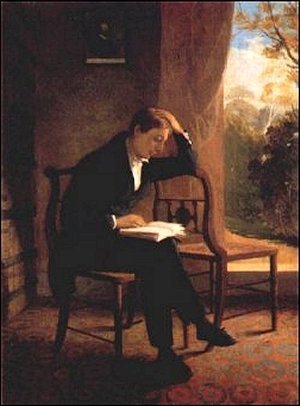
John Keats
(1795 – 1821)
To some ladies
What though while the wonders of nature exploring,
I cannot your light, mazy footsteps attend;
Nor listen to accents, that almost adoring,
Bless Cynthia’s face, the enthusiast’s friend:
Yet over the steep, whence the mountain stream rushes,
With you, kindest friends, in idea I rove;
Mark the clear tumbling crystal, its passionate gushes,
Its spray that the wild flower kindly bedews.
Why linger you so, the wild labyrinth strolling?
Why breathless, unable your bliss to declare?
Ah! you list to the nightingale’s tender condoling,
Responsive to sylphs, in the moon beamy air.
‘Tis morn, and the flowers with dew are yet drooping,
I see you are treading the verge of the sea:
And now! ah, I see it–you just now are stooping
To pick up the keep-sake intended for me.
If a cherub, on pinions of silver descending,
Had brought me a gem from the fret-work of heaven;
And smiles, with his star-cheering voice sweetly blending,
The blessings of Tighe had melodiously given;
It had not created a warmer emotion
Than the present, fair nymphs, I was blest with from you,
Than the shell, from the bright golden sands of the ocean
Which the emerald waves at your feet gladly threw.
For, indeed, ’tis a sweet and peculiar pleasure,
(And blissful is he who such happiness finds,)
To possess but a span of the hour of leisure,
In elegant, pure, and aerial minds.
john keats poetry
fleursdumal.nl poetry magazine
More in: Archive K-L, John Keats, Keats, John

John Keats
(1795-1821)
“When I have fears”
(sonnet)
When I have fears that I may cease to be
Before my pen has gleaned my teeming brain,
Before high-piled books, in charactery,
Hold like rich garners the full ripened grain;
When I behold, upon the night’s starred face,
Huge cloudy symbols of a high romance,
And think that I may never live to trace
Their shadows, with the magic hand of chance;
And when I feel, fair creature of an hour,
That I shall never look upon thee more,
Never have relish in the fairy power
Of unreflecting love; – then on the shore
Of the wide world I stand alone, and think
Till love and fame to nothingness do sink.
“Als vrees mij treft”
Als vrees mij treft dat ’k aan mijn einde ben
Voordat met letters uit mijn vloeiend brein
Een boekenberg gevuld is door mijn pen,
Zoals schuren vol met rijpe granen zijn;
Als ik, bij sterrennacht, in ’t wolkenbeeld
Verheven stof voor een Romance zie,
En denk dat mij geen tijd is toebedeeld
Voor ’n schets daarvan, met de hand van de magie.
En als ik voel, schoon schepsel van een uur,
Dat ik met jou nooit nog een weerzien vier,
Nooit meer genoegen schep in ’t tovervuur
Van onbezonnen min; – dan sta ik hier
Alleen op ’s werelds strand, en overweeg –
Tot roem en liefde voos geworden zijn en leeg.
Vertaling: Cornelis W. Schoneveld
(in Bestorm mijn hart, de beste Engelse gedichten uit de 16e-19e eeuw, Rainbow Essentials no 55, pp. 230-31)
fleursdumal.nl magazine
More in: Archive K-L, John Keats, Keats, Keats, John
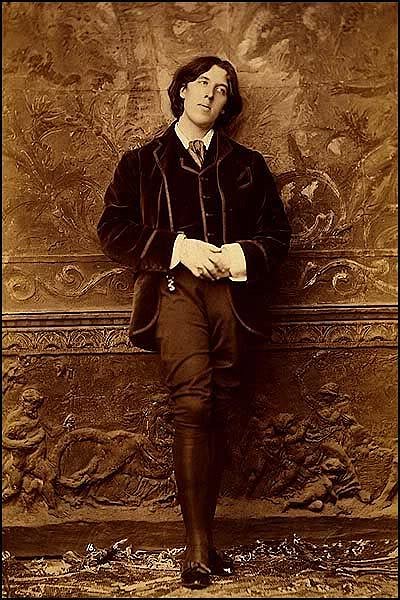
Oscar Wilde
(1854-1900)
The Grave of Keats
(sonnet)
Rid of the world’s injustice, and his pain,
He rests at last beneath God’s veil of blue:
Taken from life when life and love were new
The youngest of the martyrs here is lain,
Fair as Sebastian, and as early slain.
No cypress shades his grave, no funeral yew,
But gentle violets weeping with the dew
Weave on his bones an ever-blossoming chain.
O proudest heart that broke for misery!
O sweetest lips since those of Mitylene!
O poet-painter of our English land!
Thy name was writ in water – it shall stand:
And tears like mine will keep thy memory green,
As Isabella did her Basil tree.
Rome
Oscar Wilde
Het graf van Keats
(sonnet)
In de nieuwe vertaling van Cornelis W. Schoneveld
Van ‘s werelds onrecht en zijn pijn bevrijd,
Rust hij op ‘t laatst onder God’s hemelbaan:
Uit liefde en leven, nieuw nog, heengegaan
Ligt hier de jongste lijder neergevlijd,
Schoon als Sebastiaan, even jong ook dood.
Hier geeft cipres noch taxus schaduw af,
Maar waar viooltjes wenen op zijn graf
Is zijn gebeente nooit van bloei ontbloot.
O hart vol trots dat brak door hoe het leed!
O stem die ‘t zoetst sinds Mytylene’s is!
O schilder-dichter van ons Engeland!
Je schreef je naam in water-hij houdt stand:
En ook mijn traan steunt jouw gedachtenis,
Zoals Isabella’s balsemkruid dat deed.
Rome
VALLEND BLOEMBLAD
Verzameling van 90 korte gedichten van OSCAR WILDE
Vertaald door Cornelis W. Schoneveld
tweetalige uitgave, 2011
ongepubliceerd
fleursdumal.nl nagazine
More in: John Keats, Keats, John, Wilde, Wilde, Oscar
.jpg)
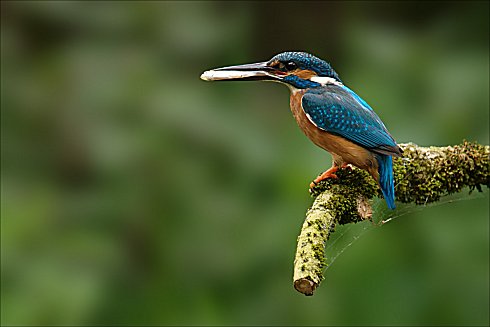
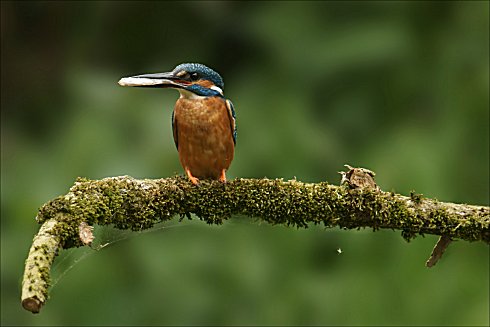
John Keats
(1795-1821)
The Human Seasons
Four Seasons fill the measure of the year;
There are four seasons in the mind of man:
He has his lusty Spring, when fancy clear
Takes in all beauty with an easy span:
He has his Summer, when luxuriously
Spring’s honied cud of youthful thought he loves
To ruminate, and by such dreaming high
Is nearest unto heaven: quiet coves
His soul has in its Autumn, when his wings
He furleth close; contented so to look
On mists in idleness–to let fair things
Pass by unheeded as a threshold brook.
He has his Winter too of pale misfeature,
Or else he would forego his mortal nature.
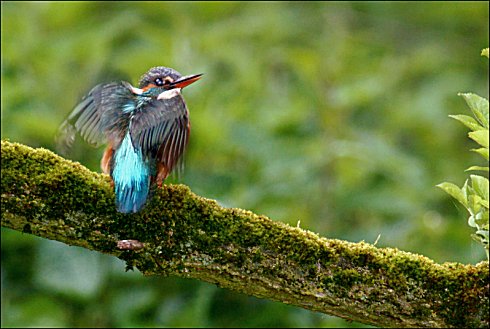

Photos: © Hans Hermans 2010
Natuurdagboek December 2010
Poem: John Keats
fleursdumal.nl magazine
More in: Hans Hermans Photos, John Keats, Keats, John, MUSEUM OF NATURAL HISTORY - department of ravens & crows, birds of prey, riding a zebra, spring, summer, autumn, winter
.jpg)

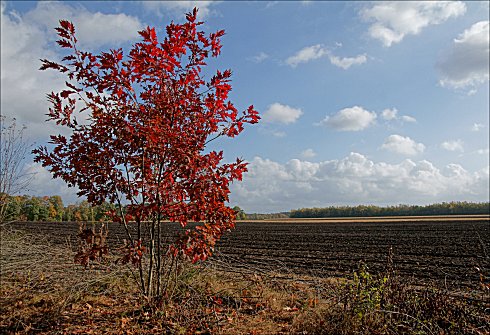
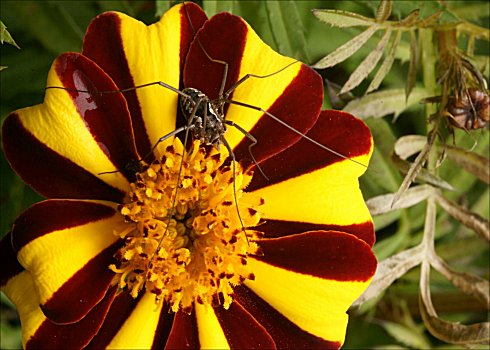
J o h n K e a t s
(1795-1821)
T o A u t u m n
Season of mists and mellow fruitfulness,
Close bosom-friend of the maturing sun;
Conspiring with him how to load and bless
With fruit the vines that round the thatch-eves run;
To bend with apples the moss’d cottage-trees,
And fill all fruit with ripeness to the core;
To swell the gourd, and plump the hazel shells
With a sweet kernel; to set budding more,
And still more, later flowers for the bees,
Until they think warm days will never cease,
For Summer has o’er-brimm’d their clammy cells.
Who hath not seen thee oft amid thy store?
Sometimes whoever seeks abroad may find
Thee sitting careless on a granary floor,
Thy hair soft-lifted by the winnowing wind;
Or on a half-reap’d furrow sound asleep,
Drows’d with the fume of poppies, while thy hook
Spares the next swath and all its twined flowers:
And sometimes like a gleaner thou dost keep
Steady thy laden head across a brook;
Or by a cyder-press, with patient look,
Thou watchest the last oozings hours by hours.
Where are the songs of Spring? Ay, where are they?
Think not of them, thou hast thy music too,–
While barred clouds bloom the soft-dying day,
And touch the stubble-plains with rosy hue;
Then in a wailful choir the small gnats mourn
Among the river sallows, borne aloft
Or sinking as the light wind lives or dies;
And full-grown lambs loud bleat from hilly bourn;
Hedge-crickets sing; and now with treble soft
The red-breast whistles from a garden-croft;
And gathering swallows twitter in the skies.

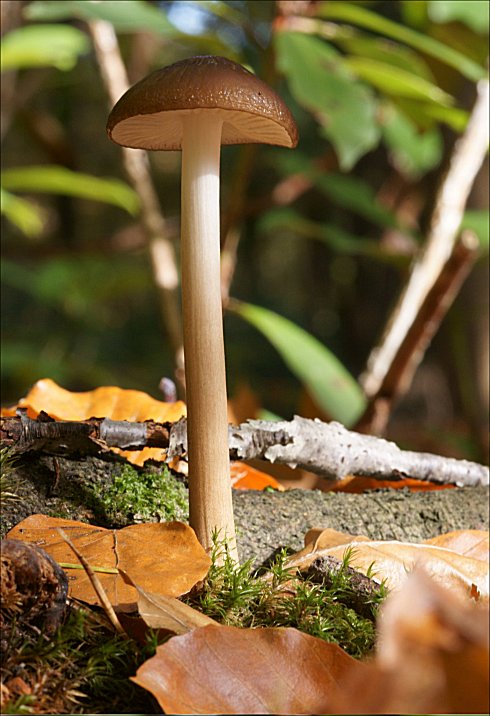
Natuurdagboek Hans Hermans October 2009
Photos Hans Hermans – Poem: John Keats
fleursdumal.nl magazine
More in: 4SEASONS#Autumn, Hans Hermans Photos, John Keats, Keats, John

John Keats
(London, 31 october 1795 – Rome, 23 february 1821)
La belle dame sans merci
Oh what can ail thee Knight at arms
Alone and palely loitering?
The sedge has withered from the Lake
And no birds sing.
Oh what can ail thee Knight at arms
So haggard, and so woe begone?
The Squirrel’s granary is full
And the harvest’s done.
I see a lily on thy brow
With anguish moist and fever dew,
And on thy cheeks a fading rose
Fast withereth too.
I met a Lady in the Meads
Full beautiful, a faery’s child,
Her hair was long, her foot was light
And her eyes were wild.
I made a garland for her head,
And bracelets too, and fragrant zone,
She look’d at me as she did love
And made sweet moan.
I set her on my pacing steed,
And nothing else saw all day long,
For sidelong would she bend and sing
A Faery’s song.
She found me roots of relish sweet,
And honey wild and manna dew,
And sure in language strange she said
I love thee true.
She took me to her elfin grot,
And there she wept and sigh’d full sore,
And there I shut her wild, wild eyes
With kisses four.
And there she lulled me asleep,
And there I dream’d, Ah! Woe betide!
The latest dream I ever dreamt
On the cold hill side.
I saw pale Kings, and Princes too,
Pale warriors, death pale were they all;
They cried, La belle dame sans merci,
Thee hath in thrall.
I saw their starv’d lips in the gloam
With horrid warning gaped wide,
And I awoke, and found me here
On the cold hill’s side.
And this is why I sojourn here
Alone and palely loitering;
Though the sedge is withered from the Lake
And no birds sing. . ..
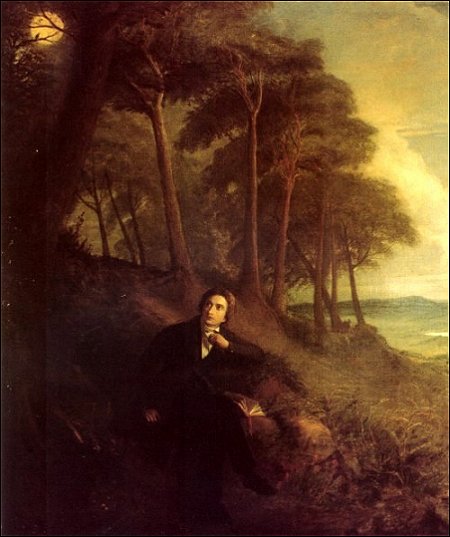

Ode to a nightingale
1
My heart aches, and a drowsy numbness pains
My sense, as though of hemlock I had drunk,
Or emptied some dull opiate to the drains
One minute past, and Lethe-wards had sunk:
‘Tis not through envy of thy happy lot,
But being too happy in thine happiness,–
That thou, light-winged Dryad of the trees,
In some melodious plot
Of beechen green, and shadows numberless,
Singest of summer in full-throated ease.
2
O, for a draught of vintage! that hath been
Cool’d a long age in the deep-delved earth,
Tasting of Flora and the country green,
Dance, and Provençal song, and sunburnt mirth!
O for a beaker full of the warm South,
Full of the true, the blushful Hippocrene,
With beaded bubbles winking at the brim,
And purple-stained mouth;
That I might drink, and leave the world unseen,
And with thee fade away into the forest dim:
3
Fade far away, dissolve, and quite forget
What thou among the leaves hast never known,
The weariness, the fever, and the fret
Here, where men sit and hear each other groan;
Where palsy shakes a few, sad, last gray hairs,
Where youth grows pale, and spectre-thin, and dies;
Where but to think is to be full of sorrow
And leaden-eyed despairs,
Where Beauty cannot keep her lustrous eyes,
Or new Love pine at them beyond to-morrow.
4
Away! away! for I will fly to thee,
Not charioted by Bacchus and his pards,
But on the viewless wings of Poesy,
Though the dull brain perplexes and retards:
Already with thee! tender is the night,
And haply the Queen-Moon is on her throne,
Cluster’d around by all her starry Fays;
But here there is no light,
Save what from heaven is with the breezes blown
Through verdurous glooms and winding mossy ways.
5
I cannot see what flowers are at my feet,
Nor what soft incense hangs upon the boughs,
But, in embalmed darkness, guess each sweet
Wherewith the seasonable month endows
The grass, the thicket, and the fruit-tree wild;
White hawthorn, and the pastoral eglantine;
Fast fading violets cover’d up in leaves;
And mid-May’s eldest child,
The coming musk-rose, full of dewy wine,
The murmurous haunt of flies on summer eves.
6
Darkling I listen; and, for many a time
I have been half in love with easeful Death,
Call’d him soft names in many a mused rhyme,
To take into the air my quiet breath;
Now more than ever seems it rich to die,
To cease upon the midnight with no pain,
While thou art pouring forth thy soul abroad
In such an ecstasy!
Still wouldst thou sing, and I have ears in vain–
To thy high requiem become a sod.
7
Thou wast not born for death, immortal Bird!
No hungry generations tread thee down;
The voice I hear this passing night was heard
In ancient days by emperor and clown:
Perhaps the self-same song that found a path
Through the sad heart of Ruth, when, sick for home,
She stood in tears amid the alien corn;
The same that oft-times hath
Charm’d magic casements, opening on the foam
Of perilous seas, in faery lands forlorn.
8
Forlorn! the very word is like a bell
To toll me back from thee to my sole self!
Adieu! the fancy cannot cheat so well
As she is fam’d to do, deceiving elf.
Adieu! adieu! thy plaintive anthem fades
Past the near meadows, over the still stream,
Up the hill-side; and now ’tis buried deep
In the next valley-glades:
Was it a vision, or a waking dream?
Fled is that music:–Do I wake or sleep?
Fancy
Ever let the Fancy roam,
Pleasure never is at home:
At a touch sweet Pleasure melteth,
Like to bubbles when rain pelteth;
Then let winged Fancy wander
Through the thought still spread beyond her:
Open wide the mind’s cage-door,
She’ll dart forth, and cloudward soar.
O sweet Fancy! let her loose;
Summer’s joys are spoilt by use,
And the enjoying of the Spring
Fades as does its blossoming;
Autumn’s red-lipp’d fruitage too,
Blushing through the mist and dew,
Cloys with tasting: What do then?
Sit thee by the ingle, when
The sear faggot blazes bright,
Spirit of a winter’s night;
When the soundless earth is muffled,
And the caked snow is shuffled
From the ploughboy’s heavy shoon;
When the Night doth meet the Noon
In a dark conspiracy
To banish Even from her sky.
Sit thee there, and send abroad,
With a mind self-overaw’d,
Fancy, high-commission’d:–send her!
She has vassals to attend her:
She will bring, in spite of frost,
Beauties that the earth hath lost;
She will bring thee, all together,
All delights of summer weather;
All the buds and bells of May,
From dewy sward or thorny spray
All the heaped Autumn’s wealth,
With a still, mysterious stealth:
She will mix these pleasures up
Like three fit wines in a cup,
And thou shalt quaff it:–thou shalt hear
Distant harvest-carols clear;
Rustle of the reaped corn;
Sweet birds antheming the morn:
And, in the same moment–hark!
‘Tis the early April lark,
Or the rooks, with busy caw,
Foraging for sticks and straw.
Thou shalt, at one glance, behold
The daisy and the marigold;
White-plum’d lilies, and the first
Hedge-grown primrose that hath burst;
Shaded hyacinth, alway
Sapphire queen of the mid-May;
And every leaf, and every flower
Pearled with the self-same shower.
Thou shalt see the field-mouse peep
Meagre from its celled sleep;
And the snake all winter-thin
Cast on sunny bank its skin;
Freckled nest-eggs thou shalt see
Hatching in the hawthorn-tree,
When the hen-bird’s wing doth rest
Quiet on her mossy nest;
Then the hurry and alarm
When the bee-hive casts its swarm;
Acorns ripe down-pattering,
While the autumn breezes sing.
Oh, sweet Fancy! let her loose;
Every thing is spoilt by use:
Where’s the cheek that doth not fade,
Too much gaz’d at? Where’s the maid
Whose lip mature is ever new?
Where’s the eye, however blue,
Doth not weary? Where’s the face
One would meet in every place?
Where’s the voice, however soft,
One would hear so very oft?
At a touch sweet Pleasure melteth
Like to bubbles when rain pelteth.
Let, then, winged Fancy find
Thee a mistress to thy mind:
Dulcet-eyed as Ceres’ daughter,
Ere the God of Torment taught her
How to frown and how to chide;
With a waist and with a side
White as Hebe’s, when her zone
Slipt its golden clasp, and down
Fell her kirtle to her feet,
While she held the goblet sweet,
And Jove grew languid.–Break the mesh
Of the Fancy’s silken leash;
Quickly break her prison-string
And such joys as these she’ll bring.–
Let the winged Fancy roam
Pleasure never is at home.

Lines on The Mermaid Tavern
Souls of Poets dead and gone,
What Elysium have ye known,
Happy field or mossy cavern,
Choicer than the Mermaid Tavern?
Have ye tippled drink more fine
Than mine host’s Canary wine?
Or are fruits of Paradise
Sweeter than those dainty pies
Of venison? O generous food!
Drest as though bold Robin Hood
Would, with his maid Marian,
Sup and bowse from horn and can.
I have heard that on a day
Mine host’s sign-board flew away,
Nobody knew whither, till
An astrologer’s old quill
To a sheepskin gave the story,
Said he saw you in your glory,
Underneath a new old-sign
Sipping beverage divine,
And pledging with contented smack
The Mermaid in the Zodiac.
Souls of Poets dead and gone,
What Elysium have ye known,
Happy field or mossy cavern,
Choicer than the Mermaid Tavern?
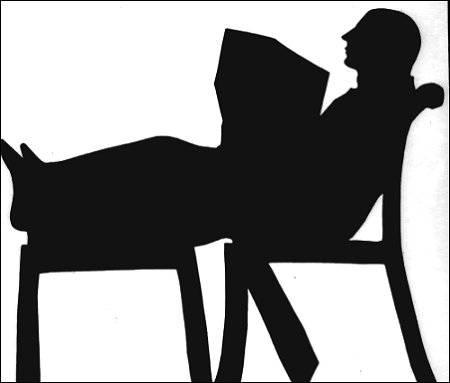
Robin Hood
To a friend
No! those days are gone away,
And their hours are old and gray,
And their minutes buried all
Under the down-trodden pall
Of the leaves of many years:
Many times have winter’s shears,
Frozen North, and chilling East,
Sounded tempests to the feast
Of the forest’s whispering fleeces,
Since men knew nor rent nor leases.
No, the bugle sounds no more,
And the twanging bow no more;
Silent is the ivory shrill
Past the heath and up the hill;
There is no mid-forest laugh,
Where lone Echo gives the half
To some wight, amaz’d to hear
Jesting, deep in forest drear.
On the fairest time of June
You may go, with sun or moon,
Or the seven stars to light you,
Or the polar ray to right you;
But you never may behold
Little John, or Robin bold;
Never one, of all the clan,
Thrumming on an empty can
Some old hunting ditty, while
He doth his green way beguile
To fair hostess Merriment,
Down beside the pasture Trent;
For he left the merry tale
Messenger for spicy ale.
Gone, the merry morris din;
Gone, the song of Gamelyn;
Gone, the tough-belted outlaw
Idling in the “grenè shawe;”
All are gone away and past!
And if Robin should be cast
Sudden from his turfed grave,
And if Marian should have
Once again her forest days,
She would weep, and he would craze:
He would swear, for all his oaks,
Fall’n beneath the dockyard strokes,
Have rotted on the briny seas;
She would weep that her wild bees
Sang not to her–strange! that honey
Can’t be got without hard money!
So it is: yet let us sing,
Honour to the old bow-string!
Honour to the bugle-horn!
Honour to the woods unshorn!
Honour to the Lincoln green!
Honour to the archer keen!
Honour to tight little John,
And the horse he rode upon!
Honour to bold Robin Hood,
Sleeping in the underwood!
Honour to maid Marian,
And to all the Sherwood-clan!
Though their days have hurried by
Let us two a burden try.
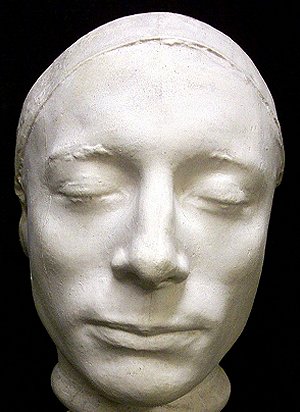
Ode on melancholy
1
No, no, go not to Lethe, neither twist
Wolf’s-bane, tight-rooted, for its poisonous wine;
Nor suffer thy pale forehead to be kiss’d
By nightshade, ruby grape of Proserpine;
Make not your rosary of yew-berries,
Nor let the beetle, nor the death-moth be
Your mournful Psyche, nor the downy owl
A partner in your sorrow’s mysteries;
For shade to shade will come too drowsily,
And drown the wakeful anguish of the soul.
2
But when the melancholy fit shall fall
Sudden from heaven like a weeping cloud,
That fosters the droop-headed flowers all,
And hides the green hill in an April shroud;
Then glut thy sorrow on a morning rose,
Or on the rainbow of the salt sand-wave,
Or on the wealth of globed peonies;
Or if thy mistress some rich anger shows,
Emprison her soft hand, and let her rave,
And feed deep, deep upon her peerless eyes.
3
She dwells with Beauty–Beauty that must die;
And Joy, whose hand is ever at his lips
Bidding adieu; and aching Pleasure nigh,
Turning to poison while the bee-mouth sips:
Ay, in the very temple of Delight
Veil’d Melancholy has her sovran shrine,
Though seen of none save him whose strenuous tongue
Can burst Joy’s grape against his palate fine;
His soul shall taste the sadness of her might,
And be among her cloudy trophies hung.
John Keats: La belle dame sans merci & other poems
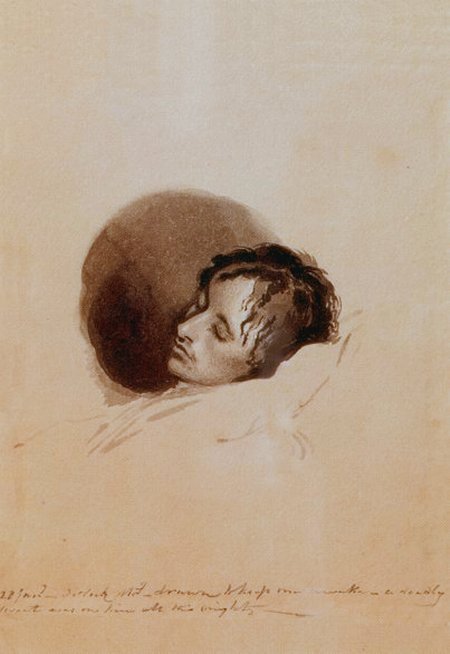
fleursdumal.nl magazine
magazine for art & literature
More in: John Keats, Keats, John

Ed Schilders
De strepen van John Keats
Er is een hardnekkig misverstand dat zegt, dat schrijven en strepen in een boek niet mag. Dat dat zoiets is als het papier striemen, of, nog erger, een vorm van lezers-onanie: een geperverteerde vorm van leesgedrag.
Daar is iets voor te zeggen, maar niet alles. Tenslotte zijn het de eigen boeken, bestemd voor de eigen ogen en gedachten, dus wie wil strepen of schrijven, die gaat zijn gang (zij het met inachtneming van het te hanteren schrijfmateriaal). En dan? Als de streper dood is en zijn boeken door de erfgenamen verkwanseld worden omdat ze meer van bankpapier houden? Juist dan worden strepen en margeschrifturen belangrijk. Het enige probleem dat ik met bestreepte boeken uit de tweede hand heb, is dat ik zelden te weten kan komen wie voor de lezersaccenten gezorgd heeft. Het ex-libris of het ex-bibliotheca is in onbruik geraakt, en namen op schutbladen is hoogst onvoldoende. Lezers zouden er minstens een gewoonte van moeten maken het boek te voorzien van jaartallen, en een korte indruk op een ingeplakt velletje papier. Zo zou je de 120 Dagen van Sodom van een staatssecretaris kunnen kopen, of de Gedachten van Leopardi van een taxichauffeur uit Lisse, beide werken voorzien van uitroeptekens in de marge. Oude boeken hebben een stamboom, en de lezer kan bijdragen aan de genealogie.

Het enige boek (in mijn kast) dat over een boek met onderstrepingen gaat, is Keats’s Shakespeare van Caroline Spurgeon (Oxford University Press, 1928). De titel zegt het al: Spurgeon onderzocht de Shakespeare-uitgave die John Keats bezat op potloodstrepen, doorhalingen en bijschriften, en vergeleek die passages met het werk van Keats zelf. Een groot deel van het boek is een nauwkeurige weergave van die pagina’s, met daarbij een voorbeeld hoe Keats zich liet inspireren door de gelezen tekst.
Die inspiratie blijkt met name in Endymion zo overweldigend te zijn dat sommigen zouden beweren dat Keats The Tempest en A Midsummer Night’s Dream geplagieerd heeft. Zo lees je niet alleen, en tegelijkertijd Spurgeon, Shakespeare en Keats, maar ook hoe Keats Shakespeare las, en hoe Spurgeon las hoe Keats Shakespeare gelezen heeft.
Vanavond knip ik dit artikel uit en zal ik het netjes en met deugdelijke lijm, in Spurgeons boek plakken. De stamboom van dit boek zal daarmee weer wat groter zijn geworden want het bevat al aardige sporen van mijn vóórlezers. Het is een bibliotheekexemplaar geweest (tussen 1935 en 1937 achtmaal uitgeleend). Toen werd het weggeschonken, en wel door het Canadian Book Centre uit Halifax. Het kwam terecht in het Moederhuis van de fraters in Tilburg dat er zijn ex-libris inplakte, en vervolgens in de centrale bibliotheek die het bestempelde. Dat de oorspronkelijke bibliotheek de Public Library van Toronto is geweest, weet ik omdat men daar met een gaatjestang de naam in de titelpagina heeft geperforeerd en op iedere prent — foto’s van de pagina’s met de strepen van Keats — een klein rond stempeltje gezet heeft om de terreur van de uitscheurders te bestrijden. Ze zijn trouwens toch heel zuinig op boeken in Toronto. Hun ex-libris wordt ten dele aan het oog onttrokken door dat van de fraters, maar de gekalligrafeerde tekst die ik nog kan lezen, zegt in vertaling: “De bibliothecaris zal ieder teruggebracht boek onderzoeken, en als hetzelfde gemarkeerd of met inkt bevlekt is, de pagina’s omgevouwen zijn, of het anderszins beschadigd is, zal de lener de waarde van het boek betalen.” Zo pak je leners aan, maar voor lezers blijft zoiets toch wel heel opmerkelijk in een boek over onderstrepingen.
.jpg)
Spurgeons boek heeft onder het frontispiece van een lezende Keats een citaat uit een van zijn brieven. “Te weten in welke houding Shakespeare zat toen hij “To be or not to be” begon op te schrijven, zoiets wordt interessant door de afstand in tijd en plaats.” Twee alinea’s hoger heeft Keats beschreven in welke houding hijzelf op dat moment zat: met de rug naar het haardvuur, aan één voet op het tapijt, de andere met de hiel enigszins opgetild. “Ik schrijf dit met “The Maid’s Tragedy”” als ondergrond, dat ik na de lunch met veel plezier gelezen heb.” Even lijkt het of hier niets anders aan de hand is dan bladvulling en behoefte aan Shakespeare, maar het toeval wil meer.
“The Maid’s Tragedy”, werd geschreven door Francis Beaumont en John Fletcher. Hun literaire samenwerking wordt geoordeeld het fraaiste toneelwerk te hebben opgeleverd op de stukken van hun tijdgenoot Shakespeare na. Beiden figureren bovendien in studies omtrent de ware identiteit van de schrijver die ‘Shakespeare’ genoemd wordt, maar van wie we geen portret hebben, geen biografie, laat staan dat we weten hoe hij achter zijn schrijftafel zat. En wat gebruikte hij als ondergrond? Met name Fletcher wordt geacht te hebben samengewerkt met Shakespeare, of Shakespeare wordt geacht bij Fletcher de inspiratie te hebben gevonden voor “Hendrik VIII”, zoals Keats zijn inspiratie vond voor “Endymion”. Strepend?
Het zoeken naar de ware biografie van Shakespeare heeft een kleine kast vol aardige, curieuze werken opgeleverd. Bacon, Essex, Raleigh, Edward de Vere, en Lord Rutland zijn de bekendste identiteiten die aan de dichter uit Stratford gegeven zijn.
Het is duidelijk dat historisch onderzoek en filologische listen de oplossing van het Shakespeare-raadsel niet meer zullen brengen. Er is, denk ik, een laatste kans. Als Shakespeare zoveel inspiratie opdeed bij andere auteurs, dan zal hij, net als Keats, ook veel gestreept hebben. Willen we ooit te weten komen wie hij was, en hoe hij zat, dan zullen we niet naar zijn verloren persoonsbewijs of zijn verdwenen manuscripten moeten zoeken maar naar de boeken die hij in zijn kast had. Naar de werken die hij las, waarin hij streepte en in de marge schreef.
.jpg)
Ed Schilders: De Strepen van John Keats
© E. Schilders
fleursdumal.nl magazine
More in: - Book Stories, BOOKS. The final chapter?, Ed Schilders, John Keats, Keats, John
Thank you for reading Fleurs du Mal - magazine for art & literature